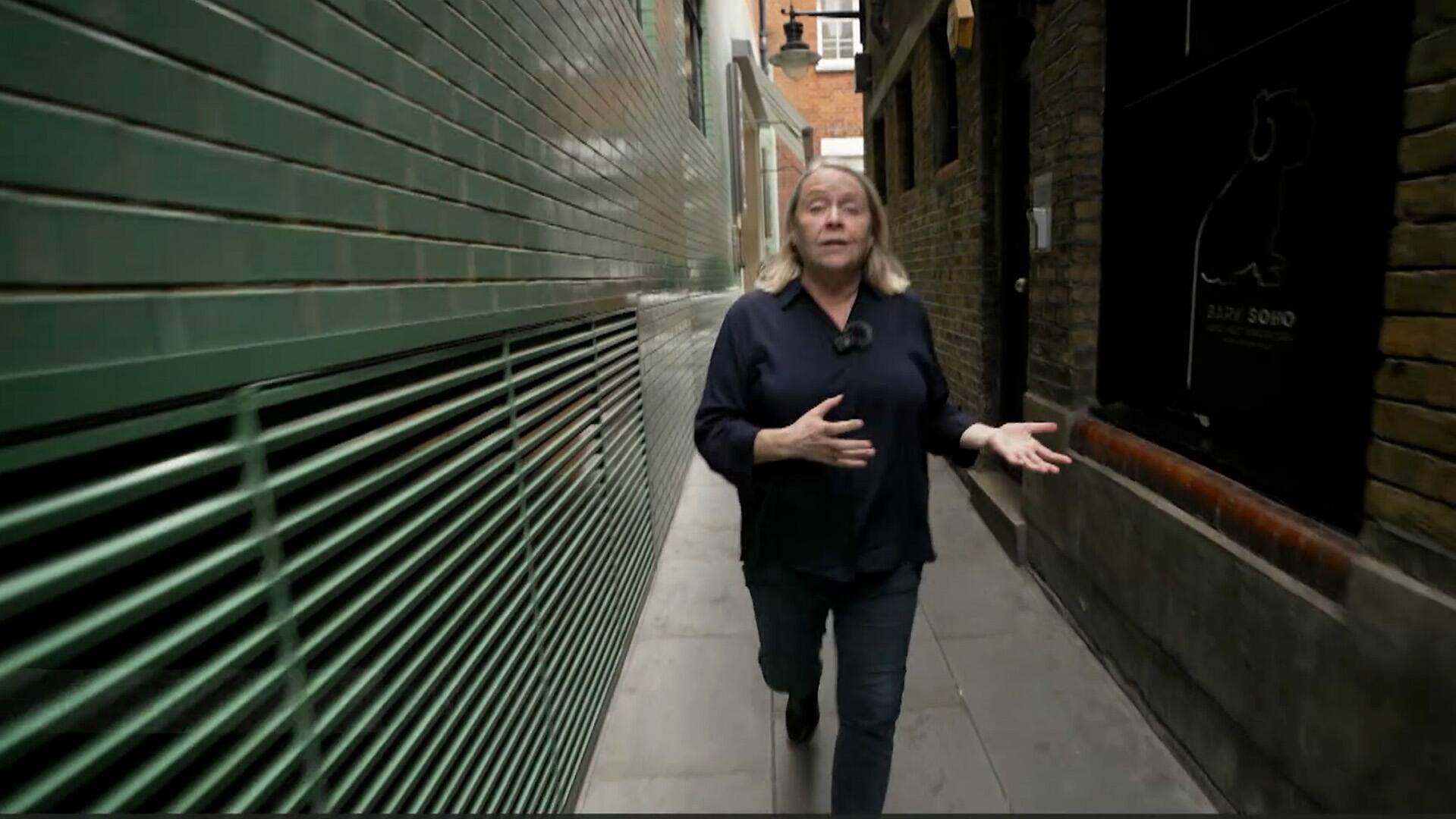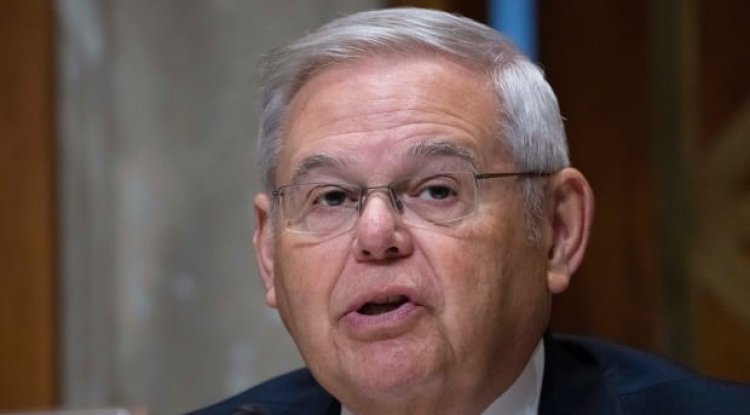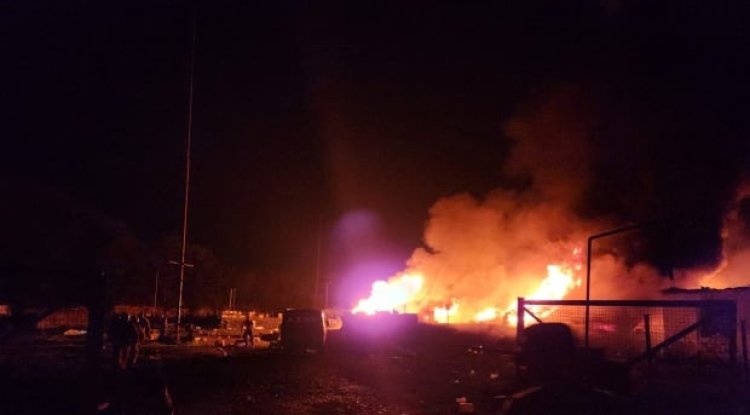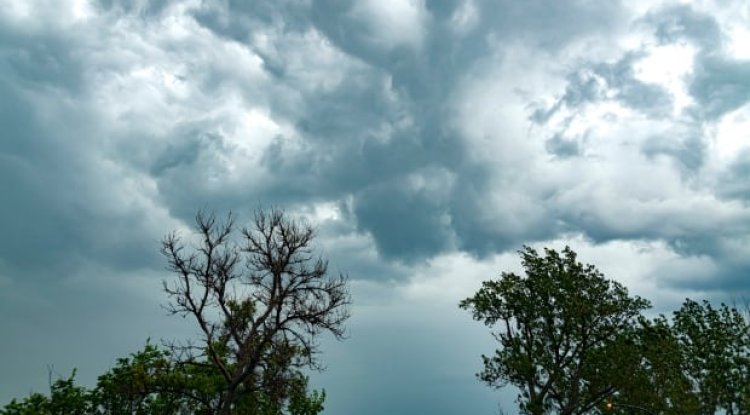Is Britain broken? Strikes, schools at risk of collapse expose broader challenges facing U.K.
Scaffolding covers a section of Balbardie Primary School on Sept. 4, in Bathgate, Scotland. Just a few days before the start of the school year, the Conservative U.K. government ordered more than 100 schools to close buildings it said were at risk of collapse due to the use of a certain type of concrete in their construction. ( Jeff J Mitchell/Getty Images)One of the most surprising details to emerge after a recent prison escape in Britain wasn't that a terrorism suspect managed to sneak out of London's Wandsworth prison by clinging to the bottom of a delivery truck. Or even that Daniel Abed Khalife, the former British soldier facing terrorism charges, was only being held in a category B security prison. It was that on the day of his escape 80 members of the prison staff — nearly 40 per cent of its workforce — were absent. And according to government figures, the prison operating with staff absence levels of between 36 and 48 per cent was more or less normal. The news prompted a scat
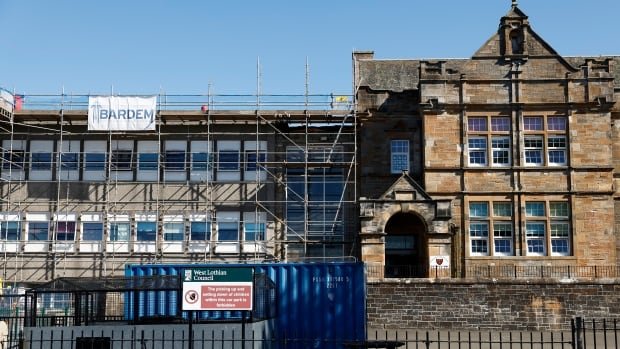
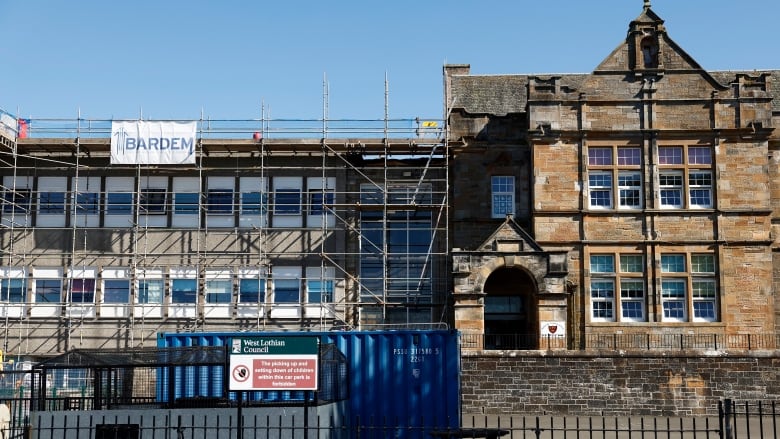
One of the most surprising details to emerge after a recent prison escape in Britain wasn't that a terrorism suspect managed to sneak out of London's Wandsworth prison by clinging to the bottom of a delivery truck.
Or even that Daniel Abed Khalife, the former British soldier facing terrorism charges, was only being held in a category B security prison.
It was that on the day of his escape 80 members of the prison staff — nearly 40 per cent of its workforce — were absent. And according to government figures, the prison operating with staff absence levels of between 36 and 48 per cent was more or less normal.
The news prompted a scathing editorial from the Times newspaper: "Living conditions are often inhumane and unsanitary, levels of rehabilitation unsatisfactory, and prison officers are both inexperienced and overstretched following years of cuts," wrote the editorial board.
The exposed failings of the prison join a growing mound of public infrastructure problems feeding a deep sense of gloom spreading across the United Kingdom, England in particular.

Prison issues microcosm of larger problems
Two years before the Sept. 6 prison escape, a prisons watchdog report described Wandsworth as "crumbling, overcrowded," and infested with vermin.
"There is a belief that things are just broken and will stay broken," said Robert Ford, a political science professor at the University of Manchester. "There is a loss of faith in government [and] a belief that these problems can't be solved."
The Wandsworth example, he says, is a microcosm of the broader challenges facing Britain.
"Why did something like that prison break happen? Because of low staffing levels. Why do low staffing levels happen? Because pay isn't high enough. Better pay is available in the private sector."
Britain has been wracked by a series of public sector strikes over the past year, from teachers to rail drivers to health-care workers.
"It's like a house with dry rot or Swiss cheese," said Ford. "It's just hopping from one crisis to the next."
Crumbling concrete in schools
At the end of August, just a few days before the start of the school year, the Conservative government led by Prime Minister Rishi Sunak ordered more than 100 schools to close buildings it said were at risk of collapse.
Weak and aging concrete with a shelf-life of about 30 years was the culprit. But the government had been made aware of the problem as early as 2018 after the collapse of a school roof in Kent.
For children prevented from attending classes in their actual schools — government numbers show 174 are now deemed to be at risk — it was a grim reminder of the remote learning that defined the COVID years.
Other public buildings, including hospitals and theatres, could also be at risk, as they were built with the same type of concrete.
And a senior official in the department of education has accused Sunak of refusing to rebuild more schools when he was head of the treasury in 2021.
The opposition Labour Party is driving home the failings every chance it gets, clearly hoping the crisis might signal an end to their long years in the political wilderness.
"Thirteen years into a Conservative government and the public realm is literally crumbling around the next generation," Labour MP and education spokesperson Bridget Phillipson said during a parliamentary debate earlier this month.

Polls suggest dissatisfaction ahead of election
In a September poll published by the Ipsos Political Monitor, eight out of 10 Britons said they were dissatisfied by the way the government is running the country.
The poll also put the Labour Party a full 20 points ahead of the Conservatives in terms of voting intentions in an election that must be held before January 2025: 44 per cent said they planned to vote Labour, while 24 per cent favoured the Conservatives.
Ford says there's a whole "wedding cake" of reasons for Britain's current state of discontent.
"Many years of austerity, cutbacks to public services, meaning a serious under investment in infrastructure, which has now produced the crisis in the schools in terms of concrete that should have been replaced many years ago, serious underinvestment in staff in the public sector, which is resulting in staff shortages in schools and in hospitals and major strikes," he said.
Dual doctor strikes
In England on Wednesday, consultants, senior doctors and junior doctors (those still undertaking clinical training), held a joint strike for the first time in the history of the National Health Service (NHS).
Dr. Rebecca Lissmann, a junior doctor working in obstetrics, was out on the picket line in front of the University College Hospital in London.
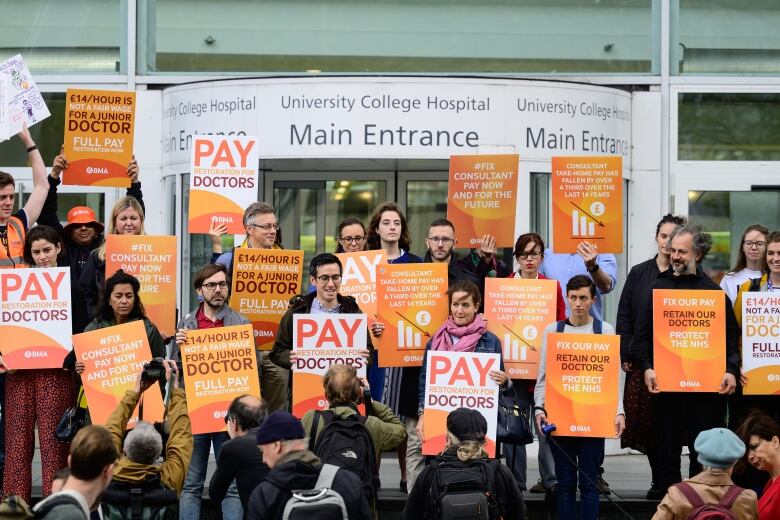
"I think it's important to say that I love the National Health Service," said Lissmann. "That's what we're here for. To defend a health service that's free at the point of use for everybody."
But she also says pressures on the NHS are both unsustainable and dangerous for patients.
"There's immense pressure to kind of do work outside your typical job because we don't have enough people, and you know, that's what you fear, because as a doctor you want to provide care that you're proud of. And if you don't have the staffing to do that, that's not a good feeling."

Hamish Bains, a medical registrar also on the picket lines, said he fears the NHS is "kind of structurally not sound."
Like many striking health-care workers, both doctors believe the government is making a political choice about the future of the NHS, pointing out that the strike has already cost millions of dollars that could have gone toward pay increase demands.
Over the summer, more than seven million people were on NHS treatment waiting lists for England, waiting lists Sunak has pledged to bring down.
He's blamed the strikes for putting that pledge in danger.

More challenges ahead
There are other nagging issues that speak to the sense of things falling apart in the United Kingdom.
Water companies have been accused of spilling sewage into rivers and the sea, and it's alleged the government has turned a blind eye.
And commuters say the rail system doesn't seem to work, even where there isn't a strike on.
No wonder headline writers in the U.K. find themselves converging on various versions of "Broken Britain" on any given day. The winter of discontent seems to have moved up a season.
It leaves all eyes on a coming election, which some expect to be called for next fall.
Ford, the political scientist, says the challenge facing any new government in Britain will be in getting the message across that fixing all that's broken is going to take time and money.
"It's going to really come down to whether or not hope beats despair in a sense," he said, speaking of those who will vote in the next election.
"They have to have faith in the ability of government to deliver those outcomes. And you know, that faith may have to sustain them for a while before things actually start to tangibly improve."
What's Your Reaction?








